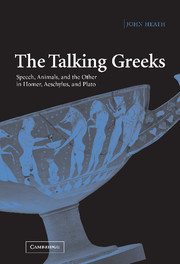Book contents
- Frontmatter
- Contents
- Preface and acknowledgments
- Introduction
- Part I SPEECH, ANIMALS, AND HUMAN STATUS IN HOMER
- Chapter 1 Bellowing like a bull: Humans and other animals in Homer
- Chapter 2 Controlling language: Telemachus learns to speak
- Chapter 3 Talking through the heroic code: Achilles learns to tell stories
- Part II LISTENING FOR THE OTHER IN CLASSICAL GREECE
- Part III SPEECH, ANIMALS, AND HUMAN STATUS IN CLASSICAL ATHENS
- Epilogue
- Bibliography
- Index
Chapter 1 - Bellowing like a bull: Humans and other animals in Homer
Published online by Cambridge University Press: 22 September 2009
- Frontmatter
- Contents
- Preface and acknowledgments
- Introduction
- Part I SPEECH, ANIMALS, AND HUMAN STATUS IN HOMER
- Chapter 1 Bellowing like a bull: Humans and other animals in Homer
- Chapter 2 Controlling language: Telemachus learns to speak
- Chapter 3 Talking through the heroic code: Achilles learns to tell stories
- Part II LISTENING FOR THE OTHER IN CLASSICAL GREECE
- Part III SPEECH, ANIMALS, AND HUMAN STATUS IN CLASSICAL ATHENS
- Epilogue
- Bibliography
- Index
Summary
Just before Achilles reenters battle, the angry hero lectures his horses not to leave him dead on the battlefield (Il. 19.400f.). This admonition in itself is not so unusual. Hector urges on his steeds with a lengthy petition (Il. 8.185–97), and the enterprising Antilochus warns his horses in the middle of a chariot race that they had better run faster if they don't want their throats slit (Il. 23.403–16). (Apparently they understand Greek, since “in fear” they immediately pick up the pace.) But in Book 19, as Achilles steps onto his chariot, something quite surprising happens: one of his immortal horses talks back. Not only does the horse converse, but he prophesies the hero's fate in ten perfect hexameters. Nothing in the epic has prepared us for this most famous talking stud in Greek literature. Can animals speak in Homer's epic world?
No, of course not. The poet is at pains to emphasize the singular unnaturalness of the utterance. Achilles is psychologically isolated from the Greek community, denying the validity of gifts, food, burial, and companionship of any kind. His butchery of Trojans over the next three books will reveal him to be part beast, his humanity sacrificed to the passion of revenge. He has dedicated himself to death, both Hector's and thus inevitably his own. Homer brilliantly marks Achilles' separation from all things human by depicting the hero conversing with his steed. As Cedric Whitman observed, “prophecies by horses are calculated to arrest attention.”
- Type
- Chapter
- Information
- The Talking GreeksSpeech, Animals, and the Other in Homer, Aeschylus, and Plato, pp. 39 - 78Publisher: Cambridge University PressPrint publication year: 2005



